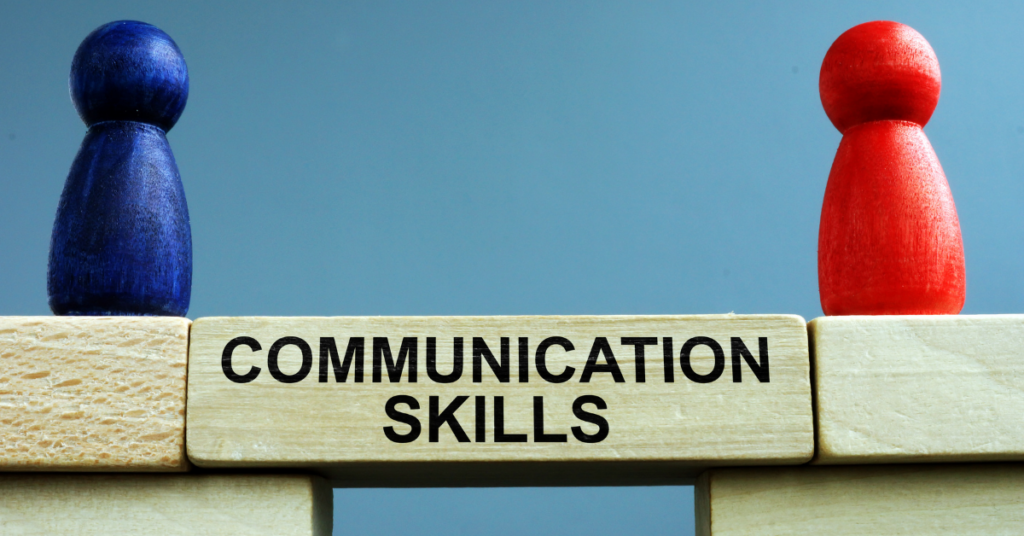How to Improve Communication Skills to up Your Career Game

You have a brilliant idea that could revolutionize your department. However, when you try to explain it in a meeting, you stumble over your words and fail to effectively explain your idea to your colleagues. Your momentum, and confidence, fizzles out at their lackluster reaction. This scenario, unfortunately, plays out more often than imagined. Communication, while it seems to be the most obvious thing, is also, unfortunately, an acquired skill. It is so much more than just talking and hearing. It’s the art of effectively conveying information in the professional arena. This includes crafting clear emails, delivering impactful presentations, and keeping everyone in the loop with timely updates. In the corporate world, thus, it is the cornerstone of success. This blog explores the importance of communication skills, the benefits of improving them, offers practical tips on how to improve communication skills, and their impact on job performance and professional development.
Why are Communication Skills Important for Career Success

To think of it, effective communication is not only about the exchange of information; it is also about understanding and articulating the emotion and intention behind the information. A workplace thrives on clear communication. When information flows freely and accurately, projects run smoothly, teams collaborate effectively, and morale stays high. On the other hand, poor communication breeds confusion, missed deadlines, and frustration. Think about it this way: a leader who cannot clearly articulate a vision inspires confusion, not action. A salesperson who mumbles through a presentation loses the sale. Strong communication skills are the difference between success and missed opportunities.
In fact, the benefits extend far beyond immediate tasks. Effective communication builds trust with colleagues and clients. When you express yourself clearly and confidently, you project professionalism and competence. This, in turn, enhances your credibility and influence within the organization.
ALSO READ: What are the Top 15 Problem-Solving Skills in 2024? Everything You Need to Know
What are the Benefits of Improving Communication Skills in the Workplace?
Talent professionals and hiring managers believe that soft skills, such as communication, are just as important as technical skills. Improving communication skills is a sure shot way to career growth. This is why you need to learn how to improve communication skills. Here are some of the benefits:
1. Enhanced Team Collaboration
Effective communication fosters teamwork. When team members communicate well, they can share ideas, solve problems, and support each other, leading to higher productivity and job satisfaction.
2. Better Relationships With Colleagues and Clients
Strong communication skills help build and maintain professional relationships. By listening actively and expressing yourself clearly, you create trust and rapport, essential for a harmonious work environment.
3. Increased Efficiency and Productivity
Clear communication reduces the chances of misunderstandings and errors. When instructions and expectations are communicated effectively, tasks are completed more efficiently, leading to better overall productivity.
4. Improved Conflict Resolution
Workplace conflicts are inevitable but good communicators can navigate disagreements and find amicable solutions. This skill is crucial for maintaining a positive workplace atmosphere.
5. Career Advancement Opportunities
Employees who communicate well are often perceived as more competent and reliable. This perception can open doors to new career opportunities, promotions, and leadership positions.
ALSO READ: 8 Popular Trends Driving the Skill-Based Economy in India
What are Some Practical Tips for Enhancing Communication Skills?
Now that we have established the importance of communication skills, let’s dive into actionable tips on how to improve communication skills:
1. Become an Active Listener

Workplace communication goes beyond simply hearing words. Pay close attention, ask clarifying questions, and paraphrase what you understand. Think of it like mirroring data back to the sender to ensure it’s received correctly.
2. Speaking in the Right Jargon
Incorporating appropriate jargon can be beneficial, especially when communicating with industry professionals. However, it’s essential to ensure that your audience understands the terms used. For example, in corporate settings, terms such as ROI, synergy, and leverage are common. Understanding and using such jargon correctly can enhance workplace communication and facilitate professional development.
3. Conveying Top-Level Data to Leadership
When presenting data to leadership, focus on clarity and conciseness. Leaders often prefer high-level overviews rather than detailed reports. Use visual aids like charts and graphs to present data effectively. Highlight key insights and recommendations to support decision-making.
4. Tailor Your Communication
Consider your audience and adjust your message accordingly. Speak in jargon-free language with non-technical colleagues and stakeholders, for instance.
5. Embrace the Power of Storytelling
Weaving narratives into your communication makes information more engaging and memorable. Think of Steve Jobs launching the iPhone; his storytelling prowess played its part in getting people interested in the product and its success.
6. Conquer Your Fear of Public Speaking
Join a Toastmasters club or take a public speaking course. Practice presenting in front of a mirror or record yourself to identify areas for improvement. Remember, even the most confident speakers practiced their way to the top.
7. The Art of Conveying Data
Don’t overwhelm your audience with technical jargon. Translate complex data into clear, concise visuals. This will help your audience visualize your idea and better grasp your vision.
8. Sharpen Your Writing Skills
Proofread emails and reports carefully. Strive for clarity, conciseness, and proper grammar. Remember, written communication is your digital footprint, so make it a good one.
9. The Power of Timeliness
Respond to emails and messages promptly. Provide regular updates to keep everyone informed, especially when deadlines are approaching. This avoids last-minute scrambles and ensures everyone’s on the same page.
10. Command the Room With Confidence
While honing your verbal communication is crucial, don’t underestimate the power of non-verbal cues as well. Make eye contact, project confidence through your posture, and use natural hand gestures to emphasize your points. Remember, neither Bhagat Singh nor Martin Luther King wouldn’t have been as charismatic and inspiring if they slouched and mumbled their message meekly. This is why learning how to improve communication skills is as much about verbal communication as it is about non-verbal communication.
ALSO READ: 10 Useful Administrative Skills That Will Make You Stand Apart in Front of Employers
Thus, mastering how to improve communication skills goes beyond just the verbal. Hone your speaking skills, becoming clear, concise, and engaging. Actively listen, showing genuine interest in what others have to say. Your ability to articulate complex ideas and build consensus will make you a valuable asset to any team. Strong communication fosters trust and collaboration, leading to a more positive and productive work environment. So focus on honing your communication skills to boost career growth. Check out the online courses offered by Emeritus and train yourself better on how to improve communication skills.
Write to us at content@emeritus.org



